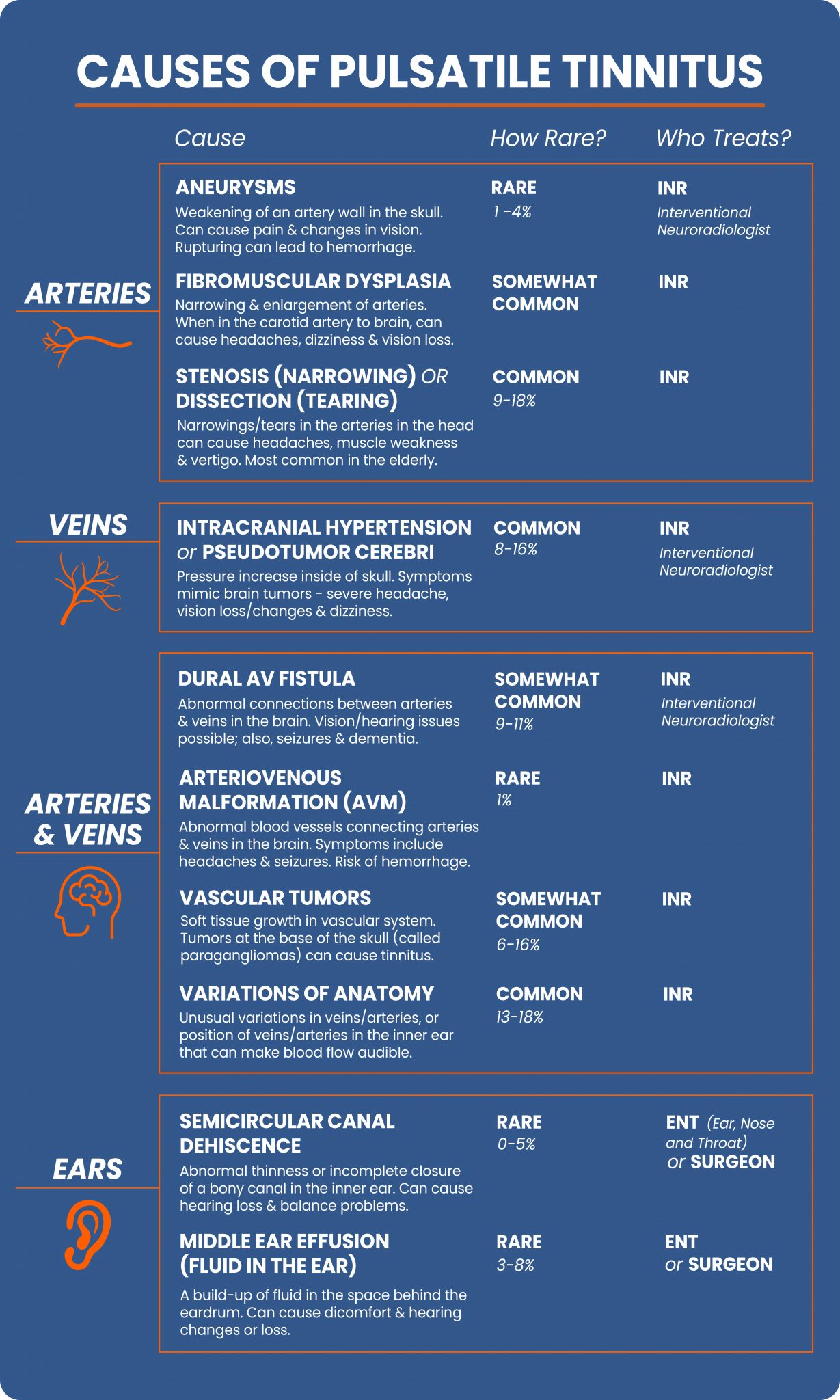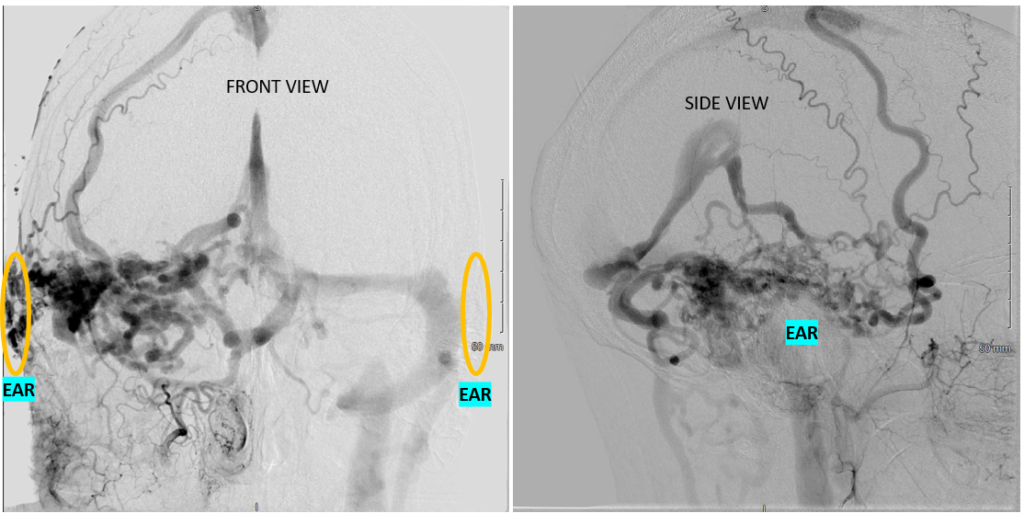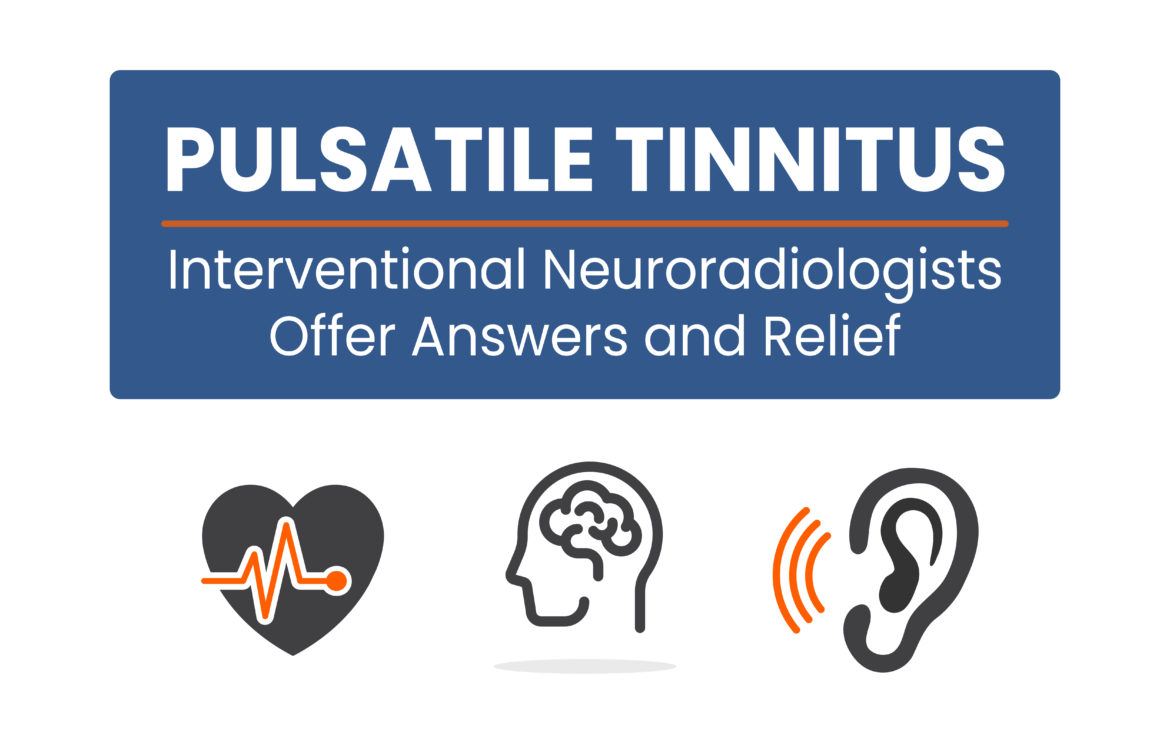Pulsatile tinnitus is a rare form of tinnitus that causes whooshing or pulsing noises in the ear. It can be a symptom of a benign condition or a more serious underlying issue. Either way, it’s often debilitating to those who experience it. And it can be difficult to diagnose and treat. Interventional neuroradiologists (also known as neurointerventional surgeons), specialize in diagnosing and treating conditions in the brain in minimally-invasive ways. They can offer answers and treatments to patients suffering from unexplained pulsatile tinnitus. In Virginia, UVA interventional neuroradiologists at Bon Secours St. Mary’s Hospital in Richmond have a dedicated pulsatile tinnitus clinic.
Most people are familiar with tinnitus. It’s a ringing, buzzing or humming sound in one or both ears that often gets worse when things are quiet. Tinnitus is also common – around one in five US adults have it.
But some people have a different kind of tinnitus. They hear a constant, rhythmic pulsing or whooshing sound in one or both ears. This sound occurs in time with their heartbeat and can make it difficult to concentrate or relax. This less common form of tinnitus is called pulsatile tinnitus. Click here to hear some examples.
The Many Causes of Pulsatile Tinnitus
Pulsatile tinnitus may be caused by an issue with blood flow in the veins or arteries in your skull. Think of it like a symptom of another condition rather than a distinct disease.
Some of the conditions that cause pulsatile tinnitus are simple to address. Others are more complicated and potentially dangerous. That’s why it’s critical for patients with pulsatile tinnitus, especially if it’s lasted for several months, to see a care provider immediately.
We’ve created this chart to show you the different causes of pulsatile tinnitus. It shows how rare or common these causes are, and what kind of doctor can treat each of them:

Diagnosing the Underlying Cause
Most patients experiencing new pulsing sounds in one or both ears start by talking to their primary care doctor or an ear, nose and throat (or ENT) doctor. If the cause of the pulsatile tinnitus is simple, like an ear infection, an ENT or primary care provider will be able to diagnose it and offer treatment.
But in some cases, an ENT or primary care doctor cannot diagnose the cause of the tinnitus. Depending on a patient’s specific symptoms, they may be referred to an ophthalmologist (eye doctor). Or they might be referred to a vascular specialist who can examine the underlying issues in veins or arteries.
Interventional Neuroradiologists Offer Insight and Relief
One type of vascular specialist who is uniquely able to diagnose and treat pulsatile tinnitus is an interventional neuroradiologist, also known as a neurointerventional surgeon.
An interventional neuroradiologist is a doctor who treats diseases and conditions in the brain and spine in minimally invasive ways. They move very small wires through your veins and arteries to treat vascular conditions or destroy tumors. They only need to make small incisions at the wrist or groin for these procedures. That means fewer complications and a shorter recovery time than traditional surgery.
Interventional neuroradiologists can diagnose and treat the vast majority of pulsatile tinnitus cases. To start, they will ask for a complete medical history. They will discuss the specific sounds you hear and how long you have heard them. They will most likely order imaging to be able to assess the causes of your tinnitus. In about half of cases, that will include a cerebral angiogram, which is a detailed x-ray of the blood vessels in your brain.

If the cause is vascular, the same neuroradiologist can perform minimally invasive procedures to address the cause. Depending on the exact cause, this could involve placing coils or stents into your veins or arteries, or using a type of glue.
Though some of these procedures are complex to perform, they are done in minimally invasive ways. That means you will only need a one-day stay in the hospital afterwards.
Pulsatile Tinnitus Clinic in Richmond, Virginia
A team of UVA neurointerventional surgeons at Bon Secours St. Mary’s Hospital in Richmond, Virginia have a dedicated pulsatile tinnitus clinic. Patients need a referral to the clinic through their ear, nose and throat provider, their ophthalmologist, or their primary care physician.
Drs. Austin, Dalal and Doss can assess the underlying cause of your pulsatile tinnitus. They can perform diagnostic exams and treat most tinnitus causes. And they can treat all patients whose pulsatile tinnitus is caused by serious medical conditions. This means they can prevent patients from experiencing a hemorrhage or an aneurysm.
To learn more, you can call the clinic directly at 804.287.7574. And remember:
- We can identify the cause of pulsatile tinnitus in most cases
- We have a state-of-the-art suite for imaging and treatment
- A referral and prior imaging is required
- Patients see the same physician for the entire process – from imaging through treatment



